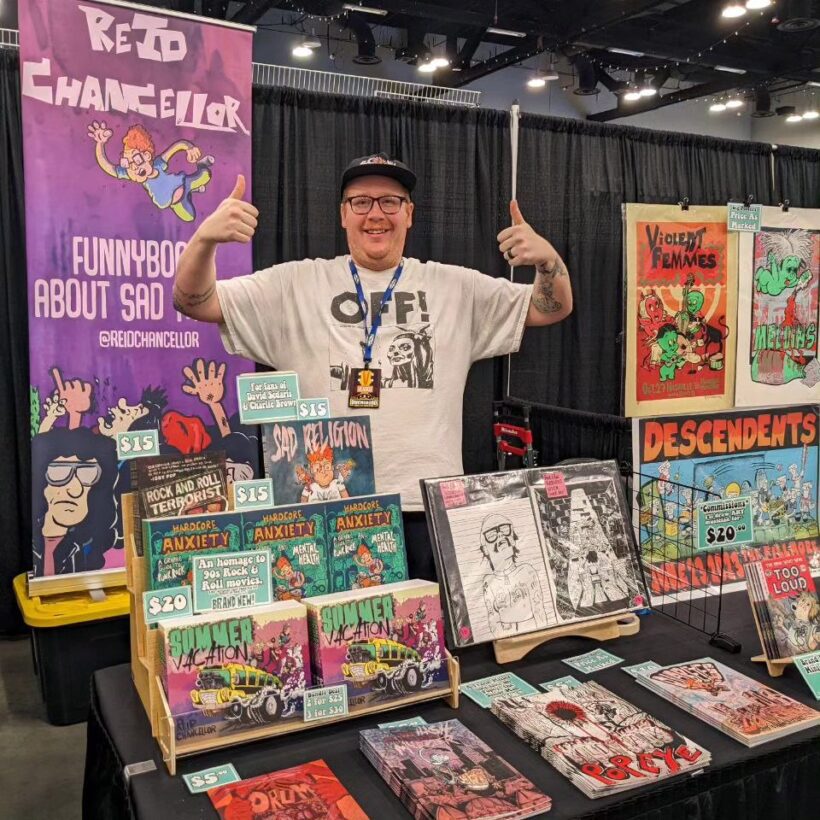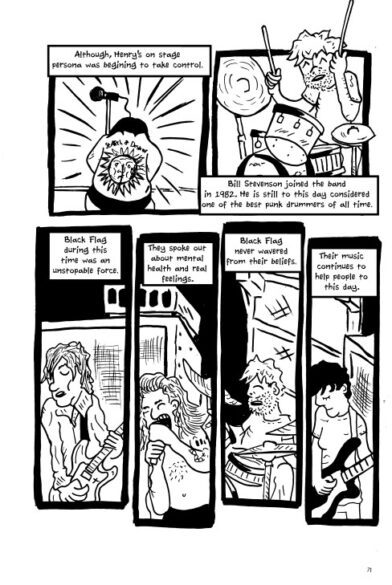
Reid Chancellor grew up a weird kid in Evansville, Indiana, silently struggling with mental health issues. He fell in love with punk and hardcore and joined bands but often felt out of place. When he discovered illustration, he found a way to express himself and work through his dark places.
As it turns out, many people identified with his stories about trying to get the better of his brain and finding a sense of worth in punk rock and hardcore music. Chancellor’s graphic novel/memoir Hardcore Anxiety: was published in 2019. He followed that up with Rock and Roll Terrorist: The Graphic Life of Shock Rocker GG Allin. One universal theme that runs through Chancellor’s work is how extreme music often helps people find the means and drive to improve their mental health and ultimately thrive despite uncertainty. A band doesn’t save your life; you do.
In addition to graphic novels, Chancellor is busy designing posters for Decibel favorites the Melvins, Descendants, and others. He talked to us about drawing, mental health, and GG Allin.
What came first – illustration or hardcore music?
I got into DIY music early. My Dad loved The Clash, Devo, The Tubes, Talking Heads, and bands like that. I started playing in bands and did that for 10 to 15 years and toured. I also drew tee-shirt designs for bands. When I met my wife, she was very into comics. She encouraged me to draw and opened up this world of underground comics. That led to my first book Hardcore Anxiety, about discovering punk and being diagnosed with bipolar disorder. Punk came first, but I was always attracted to art.
What kind of hardcore did you listen to? Were you also into metal?
I started with first-wave punk and loved The Clash and The Ramones. A friend asked me to join a hardcore band, and that’s when I first heard Bad Brains and Minor Threat. I found a kinship in that. I got really into DC hardcore. That was almost like my rebirth into punk and hardcore.
Was it hard to get the music where you grew up?
I didn’t miss out on much. My hometown had a good record store, and I remember seeing Black Flag records. I specifically remember seeing the My War album cover in that store. I didn’t buy it then because I was only about 12. When I started, I just listened to my Dad’s records.

You’ve been very open in your work about your mental health struggles. When did you start having issues with mental health?
It’s hard to pinpoint because I became aware of it later in life. I didn’t know what was going on until I met my wife. She was vocal that I talk to a professional. Until then, I just thought this is how people felt. I get very sad sometimes, and sometimes I get super excited. I didn’t have the vocabulary to explain how my emotions were all over the place. I’d say this started in middle school when I was around 12. I started noticing then that I felt sad a lot of the time.
Have you ever been hospitalized?
Never for anything like that. But I’m also a Type 1 diabetic, so I’ve been hospitalized multiple times for that. I think my depression and issues would manifest in health problems. Sometimes I would stop caring for myself and end up in the hospital for my diabetes. Once, I was in extreme diabetic ketoacidosis and on an insulin drip in the ICU for four days.
So your mental health issues led to you just giving up?
I’d say so. I struggled a lot with self-worth. I got tired of being diabetic and taking insulin shots daily and with all the extra work. I felt it wasn’t worth it. It was this strange form of self-harm.
Hardcore Anxiety
How did music and illustration help you manage mental illness?
Music helped me celebrate feeling like a freak or a weirdo. It also helped me find my people and gave me a sense of community. At the same time, I often had bad imposter syndrome. I was constantly afraid people would think I was a poser.
As I moved into illustration and got away from playing in bands, it helped because it (drawing) was something I could do in solitude. Some of the pressure disappeared, and I could sit back and express myself. If people identified with it, great. Some of that was also growing up and understanding myself better. When I made music, I had like six bands. As my mental and physical health has improved, I learned to keep myself to a schedule. I’m still a very hard worker, but I have healthier habits.
Did finding that place of acceptance help your mental health?
I knew I was different and liked different stuff than my friends. When I first heard The Ramones, my friends listened to Top 40 radio or Lynyrd Skynyrd. I knew that wasn’t me. I felt like I found my people. I felt like The Ramones were my friends. I felt like Joe Strummer was my friend. These people had a huge impact on my life.
I found cliques and tribalism when I got into metal and then hardcore. But when I listened to certain records, it was like a place I could go to check out.
I felt similar. Everything is like a different form of high school. The punk scene had tons of cliques. You do your best to surround yourself with supportive people.
When did the idea come to mix your love of punk with your mental health survival story? Did you want to reach someone like you?
On a subconscious level, I probably did. When I wrote Hardcore Anxiety, I had no idea people had similar experiences in the punk scene. Other people felt like outsiders in a group of outsiders. When people told me they identified with my story, I was amazed – I thought I was the only one. I felt like I had to tell my story even if no one cared. If this helps people understand their feelings, that is great. This music allows you to find something within yourself to survive.
You learned the most important lesson of hardcore: I will put something out, and if no one gets it, that is fine. I would have done it anyway.
I try to remember that I love making art and telling stories when drawing or writing. I’m putting it out for fun. That’s my whole mentality, and as a result, I’ve been able to do things like work with bands I admire. But if no one read a single book, I’d still be sitting around doodling.
GG Allin
I love your graphic novel about GG Allin. I think you are one of the first people I’ve seen approach him empathetically. Even the documentary Hated presents him as a maniac.
GG’s story is so odd. I wanted to tell the story beyond the chaos that we know. There isn’t much out there other than the chaos. The story is fascinating and worth examining. I don’t agree with a lot of what he did. But I found his story captivating. Whenever I found something new about GG, it seemed like a puzzle piece. I don’t think many people really knew him. He had a crazy and traumatizing life, and I thought his story was worth exploring.
There are certainly tidbits that might explain how he turned out the way he did. His dad named him Jesus Christ and thought he would be the Messiah. His father was so erratic his mother left the house with the kids in the middle of the night. This is not a stable or conventional upbringing.
He was doomed from the start. His father named him Jesus Christ Allin! When you are born into that kind of environment, your back is against the wall. His life was never going to be easy. That doesn’t excuse some of what he did but should be talked about. That’s the main idea behind the book.

It’s amazing he just didn’t end up a serial killer.
The next logical step is he’d be a killer. He even made similar comments. It’s hard to say if he was putting people on. There is evidence suggesting he might have gone there (laughs).
The big difference between GG and a band like Venom is that you never knew when GG was being serious or just trying to get a reaction.
I interviewed people who knew him well while researching the book. Everyone who met GG has a story. They never knew if he was serious or putting them on. One woman who knew him said he cared for her like a sibling. He was kind and caring but could shift his behavior at the drop of a hat. She didn’t know if he was playing a character or if that was the real GG.
Your book also acknowledges his talent. GG was a good songwriter and could sing when he wanted. He was an engaging frontman. But the showmanship supplanted the songs.
When I told my wife I was doing a GG Allin book, she got curious and listened to some of the music. She said she was scared because she thought a lot of it was good. He had talent and could have gone a different way.
What’s next for you and your work?
I am working on another graphic memoir that picks up from Hardcore Anxiety. I’ve been doing a lot of posters lately, and I’ve been lucky enough to work with the Melvins multiple times as well as Mudhoney. I’ll keep drawing comics.


